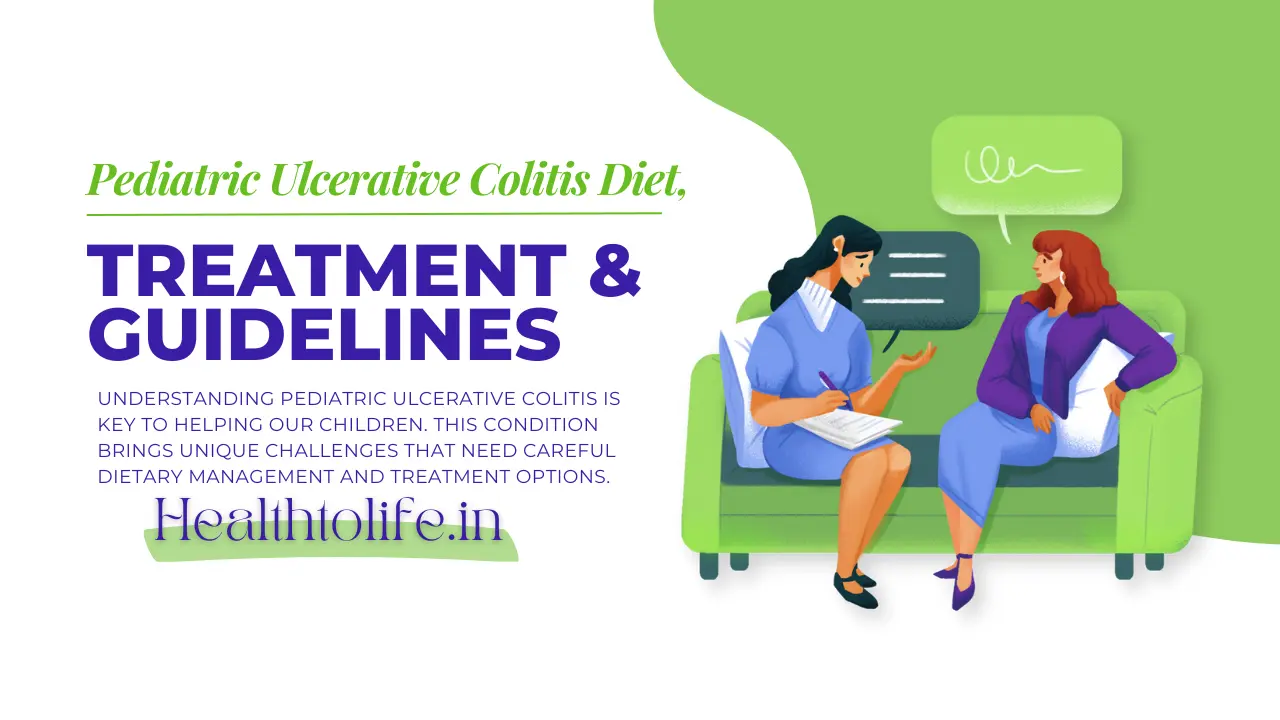
Understanding Pediatric Ulcerative Colitis is key to helping our children. This condition brings unique challenges that need careful dietary management and treatment options. We want to give guidelines for parents and caregivers to help manage this illness.
Our goal is to build a strong foundation. This foundation will help us make informed decisions for our children’s health and well-being.

Table of Contents
- Understanding Pediatric Ulcerative Colitis
- What is Ulcerative Colitis?
- Pediatric Ulcerative Colitis Diet, Treatment & Guidelines
- Importance of Nutrition
- Diagnosing Ulcerative Colitis in Kids
- Diagnostic Tests and Procedures
- Treatment Options for Pediatric Ulcerative Colitis
- Home Remedies and Lifestyle Changes
- Creating a Successful Dietary Plan
- Long-Term Management Strategies
- Monitoring Symptoms and Flare-Ups
- Support Resources for Families
- Pediatric Gastroenterology Specialists
- Emotional and Psychological Considerations
- Research and Future Directions in Treatment
- Latest Studies and Findings
- Innovative Therapies on the Horizon
- Conclusion
- FAQ
Understanding Pediatric Ulcerative Colitis
Ulcerative colitis is a chronic inflammation of the colon. It’s a type of inflammatory bowel disease (IBD). The definition of ulcerative colitis shows it as a condition where the large intestine’s lining gets inflamed. This leads to many symptoms that disrupt a child’s life.
What is Ulcerative Colitis?
This disease can severely affect young patients. It impacts the colonic mucosa and can cause serious problems if not treated. The severity of ulcerative colitis varies, affecting how we treat it in kids.
Symptoms in Children
It’s important to know the pediatric UC symptoms to act fast. Common signs include:
- Abdominal pain
- Frequent diarrhoea
- Fatigue and weakness
- Weight loss
- Blood or mucus in stools
Knowing these signs helps parents and caregivers act quickly. Early action can help manage symptoms and improve a child’s health.
Pediatric Ulcerative Colitis Diet, Treatment & Guidelines
Nutrition is key in managing pediatric ulcerative colitis. By choosing the right foods, we can ease symptoms and help our kids heal. Knowing about nutrition for ulcerative colitis helps us give the best diet recommendations for digestive health.
Importance of Nutrition
Good nutrition is crucial for kids with ulcerative colitis. It can greatly affect how they feel, as some foods help the gut, while others can make it worse. We aim for a balanced diet rich in various nutrients for our kids.
Foods to Include and Avoid
Creating a good diet plan means knowing which foods are good and which to avoid. Here’s a list of foods to include and those to limit or avoid:
| Foods to Include | Foods to Avoid |
|---|---|
| Whole grains (e.g., oats, rice) | High-fibre foods (e.g., raw fruits, vegetables) |
| Lean proteins (e.g., chicken, fish) | Dairy products (if lactose intolerant) |
| Cooked vegetables (e.g., carrots, squash) | Spicy foods |
| Low-sugar fruits (e.g., bananas, applesauce) | Processed foods |
| Hydrating fluids (e.g., water, clear broths) | Caffeinated beverages |
It’s important to avoid certain foods and choose healthier options. This careful planning helps manage ulcerative colitis well. Our approach to healthy eating for kids is all about being thoughtful and aware of their special dietary needs.
Diagnosing Ulcerative Colitis in Kids
Diagnosing ulcerative colitis in children involves many steps. It needs a mix of medical tests and procedures. Finding the right diagnosis early is key to managing the condition well. Knowing about these methods helps us support our kids through their health journey.
Diagnostic Tests and Procedures
Several tests are used to confirm ulcerative colitis in kids. A common one is the colonoscopy. It lets doctors see inside the colon. This can show inflammation, ulcers, and other signs of the condition.
Other tests are also important. These include:
- Blood Tests: Check for anaemia, infection, and inflammation markers.
- Stool Tests: Look for blood or infectious agents in the stool.
- Imaging Studies: X-rays or MRIs can give more info about the bowel’s state.
The tests chosen depend on the child’s symptoms and medical history. A pediatric gastroenterology specialist can help pick the right tests for each case.
Knowing about these tests helps us manage our child’s health better. It leads to quicker treatments and better results. Working with healthcare providers ensures we make the best decisions for our child’s care.
| Procedure | Description | Purpose |
|---|---|---|
| Colonoscopy | A minimally invasive procedure using a flexible tube with a camera. | To examine the colon’s interior for signs of ulcerative colitis. |
| Blood Tests | Laboratory tests that analyze various components in the blood. | To check for anaemia and inflammation levels. |
| Stool Tests | Tests that analyze stool samples for blood or pathogens. | To identify bleeding or infections. |
| Imaging Studies | Techniques like X-rays or MRIs to visualize abdominal organs. | To gather additional information about bowel conditions. |
Being informed about these procedures helps us work better with healthcare professionals. This ensures our child gets the best care possible.
Treatment Options for Pediatric Ulcerative Colitis
Managing pediatric ulcerative colitis requires a variety of treatments. The main goal is to ease symptoms, keep the disease in remission, and improve the child’s life. Effective treatments include medications and lifestyle changes.
Medications Used
Several medications are key in treating pediatric UC. Here are some common ones:
- Aminosalicylates: These reduce inflammation in the colon.
- Corticosteroids: They help control acute flare-ups.
- Immunomodulators: These adjust the immune response to lessen inflammation.
- Biological therapies: They target specific pathways in the inflammatory process.
Choosing the right medication for pediatric UC depends on the disease’s severity and the child’s response.
Home Remedies and Lifestyle Changes
Home remedies can help with UC treatment. Practical lifestyle changes can also manage symptoms well:
- Stress management techniques: Activities like yoga and meditation can help reduce symptoms.
- Regular exercise: Physical activity promotes overall health and can alleviate stress.
- Dietary adjustments: Identifying and avoiding food triggers will help in symptom management.
Combining these lifestyle changes with the right medication offers a comprehensive approach. This way, we can support our children in managing their condition.
Creating a Successful Dietary Plan
Making a good dietary plan is key for kids with ulcerative colitis. We need to think about what each child needs to stay healthy and avoid flare-ups. Working with a nutritionist is a big step in this process. They know a lot about kids’ diets and can give advice just for your child.
Consulting with a Nutritionist
Talking to a nutritionist helps us make a diet plan that’s just right. They can spot foods that might cause problems and suggest better choices. Nutritionists can also help with:
- Identifying safe foods
- Understanding portions and serving sizes
- Incorporating nutritional supplements if needed
Having a nutritionist on your team means we can follow the best diet advice. And we can still make sure our child likes what they eat.
Sample Meal Plans for Kids
Creating meal plans for kids with ulcerative colitis needs creativity and care. We want to make sure they enjoy their food and get the nutrients they need. Here’s a meal plan that shows how to make healthy choices for kids:
| Meal | Example Foods | Nutritional Benefits |
|---|---|---|
| Breakfast | Oatmeal with bananas and honey | High in fibre and energy |
| Snack | Yogurt with blueberries | Probiotics for gut health |
| Lunch | Grilled chicken salad with mixed greens | Lean protein and vitamins |
| Snack | Carrot sticks with hummus | Rich in vitamins and healthy fat |
| Dinner | Baked salmon with quinoa and steamed broccoli | Omega-3 fatty acids and fibre |
This meal plan shows that healthy eating can be fun and good for kids. It helps meet their needs and tastes.
Long-Term Management Strategies
For kids with ulcerative colitis, long-term care is key. It means watching symptoms closely and using strategies to stop flare-ups. Working together with doctors, caregivers, and the child helps manage this chronic illness better.
Monitoring Symptoms and Flare-Ups
Watching symptoms closely is crucial for managing ulcerative colitis. Keeping a symptom diary helps spot patterns and triggers. Here are some strategies to consider:
- Maintain a symptom diary: Record daily symptoms, diet changes, and meds to track what affects your child.
- Regular check-ups: See a pediatric gastroenterologist regularly to check on the disease and adjust treatment.
- Recognize flare-up signs: Watch for signs like more belly pain, changes in bowel movements, and feeling tired. Catching flare-ups early helps manage them better.
Here are some ways to better manage flare-ups:
- Medication adherence: Make sure your child takes their meds as directed to keep symptoms under control.
- Dietary adjustments: Change the diet based on what triggers symptoms, as found through monitoring.
- Stress management: Use activities like mindfulness, yoga, or exercise to reduce stress, which can cause symptoms.

By focusing on these long-term strategies, we can improve life for kids with ulcerative colitis. Being proactive in monitoring symptoms and having a solid plan for flare-ups are key to managing chronic illness.
| Strategy | Description | Benefits |
|---|---|---|
| Symptom Diary | A detailed log of daily symptoms and possible triggers. | Helps understand patterns and identify triggers. |
| Regular Check-ups | Regular visits to a healthcare provider. | Ensures timely treatment and proactive management. |
| Medication Adherence | Consistent use of prescribed treatments. | Helps keep symptoms in check and prevent flare-ups. |
Support Resources for Families
Families dealing with pediatric ulcerative colitis face many challenges. Finding the right support is key to emotional and practical help. Access to specialized healthcare is vital for managing the condition and improving life for our kids. Pediatric gastroenterology specialists are crucial for comprehensive care, helping families overcome ulcerative colitis challenges.
Pediatric Gastroenterology Specialists
Pediatric gastroenterology specialists are a treasure trove of knowledge for managing ulcerative colitis. They create treatment plans that fit each child’s needs. These experts help us understand potential issues, guide us on medication, and track health progress.
Family support groups and community organizations are also vital. They offer a place to share experiences and find emotional support. Being part of these groups helps us feel less alone and more supported.
Organizations focused on inflammatory bowel disease (IBD) provide advocacy and education. Connecting with these groups gives us access to valuable information on treatments and research. Here’s a table showing some key organizations and what they offer:
| Organization | Focus Area | Resources Provided |
|---|---|---|
| CCFA (Crohn’s & Colitis Foundation of America) | IBD Advocacy | Educational resources, support groups, and advocacy initiatives. |
| Kids with Crohn’s and Colitis (KWCC) | Pediatric IBD | Peer support, educational materials, and networking opportunities for families. |
| IBD Support Foundation | Patient Support | Workshops, scholarships, and resources for managing living with IBD. |
Emotional and Psychological Considerations
Managing pediatric ulcerative colitis is not just about physical symptoms. It also involves big emotional challenges. The psychological effects of ulcerative colitis can hit children and their families hard. They might feel more anxious and depressed.
This is because the illness is unpredictable. It can make people feel isolated and unsure about the future. Social withdrawal is another issue. Kids might pull back from friends because of their symptoms.
It’s crucial to tackle mental health in pediatric UC. We need to add support to their care plans. This way, we can help them cope better.
Families can use different coping strategies to deal with these feelings. Working with child psychologists who know about chronic illnesses is helpful. Support groups also offer a chance to connect with others who understand.
Practising mindfulness and relaxation can also help. These activities can boost a child’s resilience. They provide comfort during tough times.

By focusing on the emotional and psychological sides of ulcerative colitis, we can improve life for kids and their families. We want them to feel supported and understood on their journey.
Research and Future Directions in Treatment
UC research is making big strides in treating pediatric ulcerative colitis. We now understand the disease better, leading to new treatments. By joining clinical trials, families help find better ways to treat pediatric IBD.
Latest Studies and Findings
New studies aim to find markers for disease severity and treatment response. Researchers are looking at new biological agents, showing great promise. These studies push for more tailored treatments, moving away from old medicines.
The results of these studies will likely change how we treat kids with ulcerative colitis.
Innovative Therapies on the Horizon
New treatments are coming, using cutting-edge tech and new drug forms. Gene therapy and changing the gut microbiome are being explored. These methods could lead to better, safer treatments.
As we move forward, clinical trials will be key. Our work in UC research will help bring these new treatments to life. This will greatly improve the lives of children and their families.
| Therapy Type | Description | Current Status |
|---|---|---|
| Biologics | Targeted therapies that interfere with specific pathways in the immune response. | Widely used and ongoing studies to refine their efficacy. |
| Gene Therapy | Aimed at correcting underlying genetic defects related to UC. | In early-phase clinical trials. |
| Microbiome Modulation | Therapies that adjust gut bacteria to improve health and reduce inflammation. | Ongoing research to validate effectiveness. |
| Stem Cell Therapy | Utilizes stem cells to regenerate damaged tissues in the intestines. | Research in progress with promising outcomes. |
Conclusion
Managing pediatric ulcerative colitis needs a complete plan. This plan includes medicine, diet, and a strong support system. We’ve shown how working together is key to the best health results.
Education and support are very important. Knowing about your child’s needs and diet helps a lot. It also helps kids feel more in control of their health.
Our fight against pediatric ulcerative colitis is a team effort. Talking openly and sharing ideas makes our care better. With a deep understanding of treatments and support, we can greatly improve life for kids with this condition.
Learn more about health-related treatment options. Click here
FAQ
Ques-1: What is Pediatric Ulcerative Colitis?
Ans: Pediatric ulcerative colitis is a chronic disease that affects the large intestine in kids. It causes symptoms like belly pain, diarrhoea, and tiredness. These symptoms can really hurt their health and happiness.
Ques-2: What dietary changes are recommended for children with Ulcerative Colitis?
Ans: We suggest a diet rich in whole grains, lean proteins, fruits, and cooked veggies. Avoiding high-fiber foods, dairy, and processed items is key. A custom diet plan can help manage symptoms and meet nutritional needs.
Ques-3: How is Pediatric Ulcerative Colitis diagnosed?
Ans: Doctors use a patient’s history, physical check-ups, and tests like colonoscopies and blood work. These steps help confirm the diagnosis and understand how severe it is.
Ques-4: What treatment options are available for managing Pediatric Ulcerative Colitis?
Ans: Treatments include medicines like aminosalicylates and biologics. Home remedies and lifestyle changes, like managing stress and staying active, also help. These can improve our kids’ lives and symptoms.
Ques-5: How can we create a successful dietary plan for our child with Ulcerative Colitis?
Ans: Working with a dietitian who knows about kids’ GI issues is crucial. They can create a diet plan that fits our child’s needs. Meal plans can also offer great ideas for healthy foods.
Ques-6: What long-term management strategies should we consider for our child?
Ans: Keeping an eye on symptoms and knowing when they flare up is key. Being proactive, with regular doctor visits and open talks, helps support our child’s health over time.
Ques-7: What support resources are available for families dealing with Pediatric Ulcerative Colitis?
Ans: Families can find help from specialists, support groups, and IBD-focused organizations. These resources offer emotional and healthcare support during tough times.
Ques-8: How does Pediatric Ulcerative Colitis affect the emotional well-being of children?
Ans: Kids with ulcerative colitis might feel anxious, depressed, or withdrawn. Seeking therapy and building a strong support network can help them deal with these feelings. It also creates a positive environment.
Ques-9: What are the latest advancements in Pediatric Ulcerative Colitis research?
Ans: Research aims to improve treatments and understand the disease better. Keeping up with clinical trials and new therapies gives us hope for better management and outcomes for our kids.
This Topic Related Video
Was this article helpful?
Stay updated with the latest posts on HealthToLife—expert health tips, wellness trends, and life-changing advice you don’t want to miss. Click to explore.



